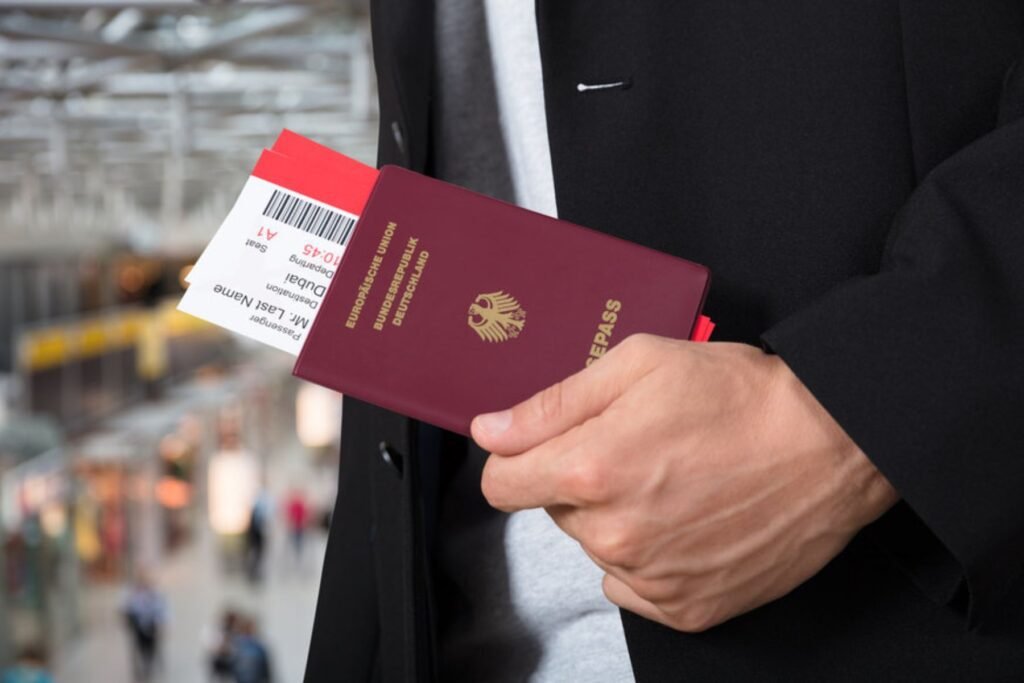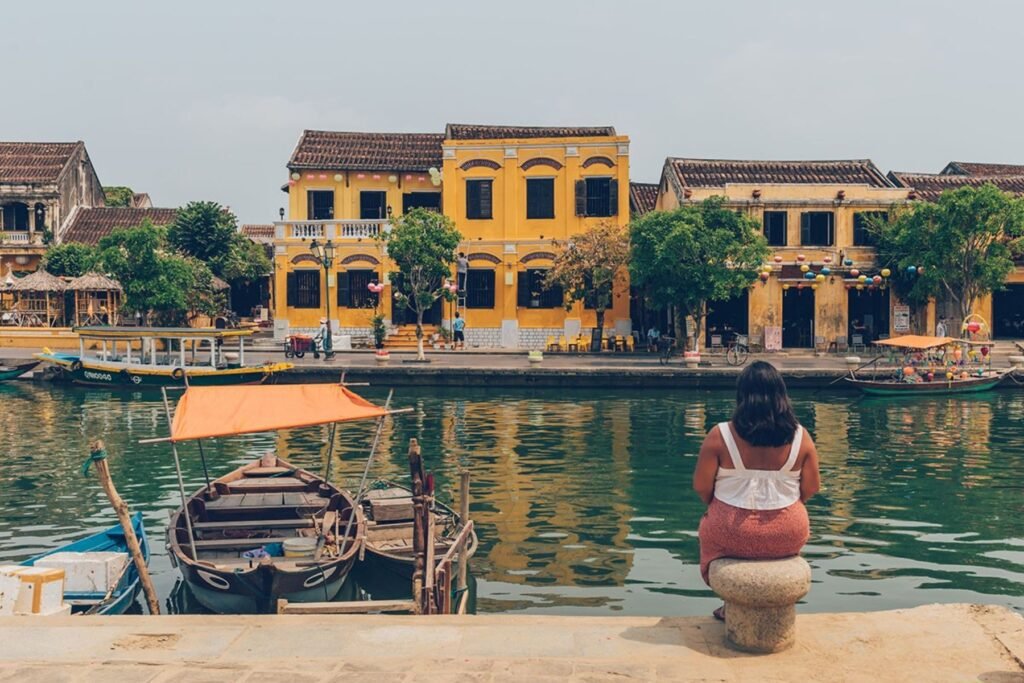Vietnam Trip Planning for Germans: Visa, Flights & Budget Tips
 ngocdiem
ngocdiem Planning a trip to Vietnam is an exciting adventure for German travelers, thanks to the country’s stunning nature, lively cities, and rich culture. To make the most of your journey, good preparation is essential — from visas and flights to budgeting tips. In this guide, Sun Getaways Travel provides all the key information German tourists need for a smooth, enjoyable, and unforgettable experience in Vietnam and Vietnam visa Germans.
1. Why Germans Love Traveling to Vietnam
A Culture Rich in History and Heart
Vietnam’s culture is a colorful mix of ancient customs, French colonial influence, and local traditions that have been passed down for centuries. Whether you’re exploring the lantern-lit streets of Hoi An or visiting a traditional floating market in the Mekong Delta, you’ll be immersed in experiences unlike anywhere else. Many German travelers appreciate how welcoming and kind the Vietnamese people are — a warm hospitality that makes every encounter feel personal.
A Culinary Paradise
Food lovers from Germany are often amazed by Vietnam’s cuisine. From savory pho and banh mi to fresh seafood and tropical fruits, the flavors are both unique and accessible. Vietnam street food isn’t just affordable — it’s award-winning. Sampling dishes on small plastic stools by the roadside is part of the authentic experience, and a delicious highlight of any well-planned Vietnam trip planning German tourists should not miss.
Natural Beauty That Captivates
From the towering limestone cliffs of Ha Long Bay to the terraced rice paddies in northern mountains like Sapa, Vietnam is home to some of Southeast Asia’s most stunning landscapes. For Germans seeking nature, peace, and photography opportunities, the scenery here is truly unforgettable.


An Affordable Travel Destination
One of the biggest reasons German visitors love Vietnam is its affordable travel costs. Compared to many European or Western destinations, your budget can stretch much further here. With proper Vietnam trip planning, German travelers can enjoy comfortable hotels, delicious meals, and exciting activities — all at a fraction of the cost. That’s why we’ll also be sharing important Vietnam budget tips later in this guide.
👉 Explore: Vietnam Budget Beach Vacation: Your Guide to Affordable Stays and Adventures
Great Weather Year-Round
Thanks to its diverse geography, Vietnam offers good travel conditions in every season. Whether you’re chasing sunshine on the central coast or cooler mountain air in the north, there’s always somewhere in Vietnam with pleasant weather — perfect for flexible travel plans and outdoor adventures.
👉 Explore: 6 Days Join Group Ho Chi Minh With Floating Market
2. Vietnam Visa Germans
In this section, we’ll guide you through all the essentials related to the Vietnam visa Germans need — from exemptions to application steps.
2.1 Vietnam visa Germans
Yes — but there’s good news! Under Vietnam visa Germans exemption policy, German passport holders can enter Vietnam without a visa for up to 45 days (as of recent regulations). This means if your trip is under 45 days and for tourism purposes, you may not need to apply in advance.
However, if you plan to stay longer, re-enter the country, or engage in non-tourism activities, you will need a visa. That’s why understanding your travel intentions is crucial in Vietnam trip planning. German travelers should always check the latest policies before departure.
2.2 Types of Vietnam Visas
If your trip extends beyond the exemption period, or if you prefer the assurance of having a visa in hand, you have a few options:
- ✨ Convenient and entirely online
- ✨ Valid for 90 days, single or multiple entries
- ✨ Ideal for tourists and business travelers
- ✨ Apply via Vietnam’s official e-visa portal
Visa on Arrival
- ✨ Applied for online, then stamped upon arrival at a major airport
- ✨ Requires pre-approval letter from a Vietnamese travel agency
- ✨ Available only for air travelers
- ✨ Can be used for longer stays or multiple entries
Visa via the Vietnamese Embassy
- ✨ Traditional option for those who prefer full documentation before travel
- ✨ Requires in-person or postal submission of documents
- ✨ Longer processing time but very reliable
- ✨ Recommended for travelers with special travel needs or complex itineraries


👉 Explore: 5 Days Join Group Ho Chi Minh With Floating Market
2.3 How to Apply for a Vietnam Visa from Germany
Here’s a step-by-step guide to help you through the process of applying for a Vietnam visa from Germany:
✅ Step 1: Choose your visa type
Decide between an e-visa, visa on arrival, or applying via the embassy based on your travel duration and preferences.
✅ Step 2: Gather required documents
- ✨ A valid German passport (minimum 6 months validity)
- ✨ Recent passport-sized photo
- ✨ Completed application form (if using the embassy method)
- ✨ Travel itinerary and accommodation details (may be required)
✅ Step 3: Submit your application
- ✨ For e-visas: Visit the official Vietnamese immigration website
- ✨ For embassy applications: Send documents via mail or deliver in person to the Vietnamese embassy in Berlin or consulate offices
✅ Step 4: Pay the visa fee
Fees vary depending on visa type and length of stay. E-visas generally cost around 25 USD. Visa on arrival requires two payments — one online for the approval letter and one at the airport for the stamp.
✅ Step 5: Wait for processing
- ✨ E-visas: 3–5 working days
- ✨ Visa on arrival approval letter: 2–3 working days
- ✨ Embassy visa: 5–7 working days.
3. Vietnam Budget Tips for German Travelers
For many German tourists, one of the most appealing aspects of visiting Vietnam is how affordable it is. But even in a budget-friendly destination, knowing how to spend wisely can make your journey smoother and more enjoyable. This section offers practical Vietnam budget tips that will help you get the most out of every euro — without sacrificing comfort or experience.
Effective Vietnam trip planning German travelers do goes beyond flights and visas — it’s also about managing expenses and making smart choices on the ground.
3.1 Average Daily Travel Expenses in Vietnam
Vietnam is known for being one of the most cost-effective countries in Southeast Asia. Here’s a breakdown of typical daily expenses to help you plan:
- ✨ Food: 5–10 EUR/day (especially if you eat local street food or in casual restaurants)
- ✨ Accommodation: 10–25 EUR/night for budget stays, more for mid-range options
- ✨ Transportation: 1–5 EUR/day for buses, Grab rides, or trains within cities
- ✨ Attractions: 1–10 EUR depending on entry fees, tours, or experiences
A daily budget of 30–50 EUR is enough for most German travelers to enjoy Vietnam comfortably. With these Vietnam budget tips, your travel funds can stretch a long way.


3.2 Affordable Accommodation Options
Finding a cozy place to stay doesn’t have to be expensive. Vietnam offers a wide range of affordable lodging options, including:
- ✨ Budget hotels – Clean, comfortable, and often with breakfast included
- ✨ Hostels – Great for solo travelers or backpackers looking to meet others
- ✨ Homestays – Experience local hospitality and culture firsthand
- ✨ Guesthouses and boutique stays – Small, family-run, and full of character
3.3 How to Save on Food and Transportation
Two major ways to reduce travel costs are eating like a local and choosing affordable transport:
- ✨ Street food stalls and local markets offer delicious meals for just 1–2 EUR. Try dishes like pho, banh mi, or bun cha — tasty, fresh, and inexpensive.
- ✨ Food courts and “com binh dan” (worker-style lunch spots) serve full meals at great prices.
For getting around:
- ✨ Grab (Vietnam’s version of Uber) is reliable and much cheaper than taxis
- ✨ Public buses and trains are safe and easy to use
- ✨ For longer trips between cities, sleeper buses and trains offer budget-friendly alternatives to domestic flights
👉 Explore: Flight to Vietnam: Top Airports and Airlines You Should Know
4. Sample 2-Week Vietnam Itinerary for Germans
Day 1–3: Hanoi
Begin in Vietnam’s historic capital:
- ✨ Stroll around the Old Quarter
- ✨ Visit the Ho Chi Minh Mausoleum and Temple of Literature
- ✨ Enjoy traditional dishes like bun cha or egg coffee
Budget tip: Stay in a boutique guesthouse (15–25 EUR/night), and use Grab or buses to explore the city affordably.
Day 4–5: Ha Long Bay
Take a 2-day, 1-night cruise through this UNESCO World Heritage Site:
- ✨ Cruise past limestone karsts
- ✨ Kayak in hidden lagoons
- ✨ Enjoy fresh seafood on board
Budget estimate: Cruises range from 80–150 EUR, depending on the level of comfort. Book in Hanoi for better rates.
Day 6–7: Hue
Fly or take the train south to the ancient imperial capital:
- ✨ Visit the Hue Imperial Citadel
- ✨ Explore royal tombs along the Perfume River
Budget tip: Affordable accommodations (10–20 EUR) are widely available. Renting a bike or scooter is a great way to save and explore.


Day 8–10: Hoi An
A short drive or bus ride brings you to the charming town of Hoi An:
- ✨ Wander the Ancient Town
- ✨ Try a cooking class
- ✨ Visit An Bang Beach
Vietnam budget tips: Many homestays offer free bikes and breakfast. Eating local (banh mi, cao lau) keeps food costs low.
Day 11–13: Ho Chi Minh City (Saigon)
Fly to the south for a modern contrast:
- ✨ Visit the War Remnants Museum and Cu Chi Tunnels
- ✨ Explore lively markets like Ben Thanh
- ✨ Enjoy rooftop views at sunset
Budget accommodation in District 1 starts at 12 EUR. Local restaurants and night markets provide cheap and tasty meals.
Day 14: Mekong Delta
End your journey with a day trip or overnight stay:
- ✨ Boat tours through floating markets
- ✨ Discover rural life and traditional workshops
Expect to spend 20–40 EUR for a guided tour with transport from Ho Chi Minh City.
👉 Explore: 7 Days Northern Vietnam Tour: Hanoi, Halong, Sapa
5. Practical Travel Tips
Cultural Etiquette and Communication Tips
Vietnamese people are warm, welcoming, and respectful — and appreciate the same in return. Keep these in mind:
- ✨ Greet with a smile and polite body language
- ✨ Avoid public displays of affection
- ✨ Dress modestly when visiting temples or pagodas
- ✨ Remove shoes when entering someone’s home
- ✨ Learn a few simple phrases in Vietnamese like “Xin chào” (Hello) or “Cảm ơn” (Thank you)
English is commonly spoken in tourist areas, but a little effort to speak Vietnamese goes a long way.


Staying Safe and Avoiding Common Scams
Vietnam is generally safe, but it’s wise to be cautious:
- ✨ Avoid overcharging by agreeing on prices upfront (especially for taxis or tours)
- ✨ Use Grab or licensed taxis instead of flagging cars off the street
- ✨ Beware of pickpockets in crowded areas — keep valuables close
- ✨ Always book tours and transfers through trusted providers
A little awareness goes a long way in ensuring a smooth, enjoyable experience.
Useful Travel Apps for Navigation, Translation, and Booking
Here are a few apps German travelers will find handy:
- ✨ Google Maps – Essential for directions and transit
- ✨ Grab – Affordable transport and food delivery
- ✨ Google Translate – For real-time language help
- ✨ Booking.com / Agoda – Reliable hotel booking platforms
- ✨ XE Currency – Quick exchange rate checks
- ✨ MoMo / ZaloPay – Popular local payment apps (if you get a local SIM)
👉 Explore: Using Mobile Wallets in Vietnam: Momo, ZaloPay & VNPay
6. FAQs
1. Do Germans need a visa to visit Vietnam?
Yes, but not always. German passport holders can enter Vietnam visa-free for up to 45 days. If you plan to stay longer or want multiple entries, you will need to apply for an e-visa, visa on arrival, or visit the Vietnamese embassy. For more information, refer to our section on Vietnam visa Germans.
2. How much does a trip to Vietnam cost for 2 weeks?
A well-managed 2-week trip can cost between 700–1,000 EUR per person, including accommodation, local transportation, food, flights within Vietnam, and guided tours. Check out our detailed section on Vietnam budget tips for money-saving ideas and smart travel options.
3. What is the best time of year for Germans to travel to Vietnam?
The best time depends on where you plan to go:
- ✨ North Vietnam (Hanoi, Ha Long Bay): March–May and September–November for pleasant weather
- ✨ Central Vietnam (Hue, Hoi An): February–August is the dry season
- ✨ South Vietnam (Ho Chi Minh City, Mekong Delta): Warm year-round, but December–April is driest
7. Conclusion
Planning a trip to Vietnam as a German traveler is an exciting journey in itself — and being well-prepared can make all the difference. From understanding visa requirements and booking affordable flights, to managing your travel budget and exploring Vietnam’s top destinations, this guide has offered a complete roadmap for smooth Vietnam trip planning German tourists can trust.
Now is the perfect time to turn inspiration into action. Start your own Vietnam trip planning German journey today — and let Sun Getaways Travel help you explore the best that Vietnam has to offer. We are here to support you every step of the way.
Ask a question
Leave a Comment (0)
No questions yet. Be the first to ask a question!





















